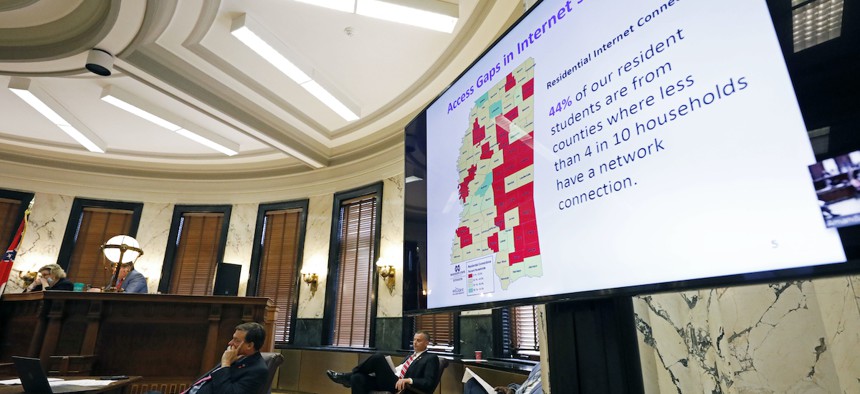Connecting state and local government leaders
A new report from the National Governors Association suggests states shouldn't just rely on the FCC to identify underserved areas, as well as use existing infrastructure and federal funding to increase connectivity in rural and low-income areas.
States can begin to address inequitable access to broadband by improving coverage maps that detail where connections aren't available or are too slow, similar to a pilot program implemented in Georgia, the National Governors Association said in a white paper released this month.
"The collection of data on current broadband availability and provided service speeds is critical in prioritizing expansion efforts," the paper said. "This data is currently collected and mapped by the [Federal Communications Commission], but as the FCC acknowledges, the data collected ... is imperfect."
Lack of widespread, high-speed broadband has been a pain point for states across the country for years, but the problem has been highlighted by the Covid-19 pandemic.
“The Covid-19 pandemic has underscored the reality that many aspects of modern-day life, including commerce, health care, education and social activity, are dependent on connectivity. Layered across these uses are social, economic and geographic factors that limit equitable access,” the report said. “The pandemic exacerbates disparities caused by the absence of reliable broadband, but the need for accessible and affordable broadband extends far beyond the current situation.”
More than 18 million people lacked access to fixed broadband in the United States in 2018, according to data collected by the FCC. The vast majority—14 million—of those unconnected people live in rural areas, with an additional 1 million residing on tribal lands. Multiple studies have found that federal data undercounts those populations, the report adds, so the number of people affected by lack of reliable connectivity “may be as high as 42 million.”
States can address that problem by creating their own coverage maps to help determine where broadband funding is most needed, the report said. For example, in 2018, Georgia launched its Broadband Deployment Initiative, which mapped residential-level broadband availability data more comprehensively than the FCC by using more specific internet speed thresholds to label areas as “served” or “underserved.” The map produced by the initiative this year, the report said, “showed significantly more areas of the state lacked broadband coverage than had been identified” by the FCC.
Adding extra layers to those mapping efforts—including “publicly available WiFi hotspot locations,” for example—can provide better information for residents and agencies during the Covid-19 pandemic, the report said.
“More accurate maps of the availability, quality and cost of broadband services in each state and territory provide governors with an important tool to better inform residents and measure the progress of state programs,” it said.
The report highlights effective broadband deployment strategies from dozens of states, including a task force in North Carolina that brought together state agencies and internet providers to conduct speed tests, increase WiFi hotspots and widen outreach, resulting in a 44% increase in statewide connectivity from 2014 to 2019.
It also explains how states can leverage federal coronavirus relief funding to improve broadband access, using examples from multiple states. In Michigan, for example, officials allocated $25 million “to support connectivity for school children and their families,” with preference given to communities with higher rates of poverty.
But even with additional funding streams and successful programs to emulate, there are persistent challenges to equitable broadband expansion, including program-specific federal earmarks and the inherent difficulty in attracting multiple providers to rural and lower-income communities.
“In rural areas, low population densities may make new investment uneconomic for traditional providers. In low-income urban areas, there may be a lack of incentive for new entrants to compete, resulting in monopolies or duopolies that keep prices high,” the paper concludes. “Governors can consider how investments may reduce these barriers for new and alternative providers to enter those markets. Further, governors may wish to explore any policy or regulatory barriers that prohibit new market entrants from competing.”
Kate Elizabeth Queram is a staff correspondent for Route Fifty and is based in Washington, D.C.

NEXT STORY: House Bill Would Create NOAA-Led National Database to Help Coastal Communities Confront Rising Seas



